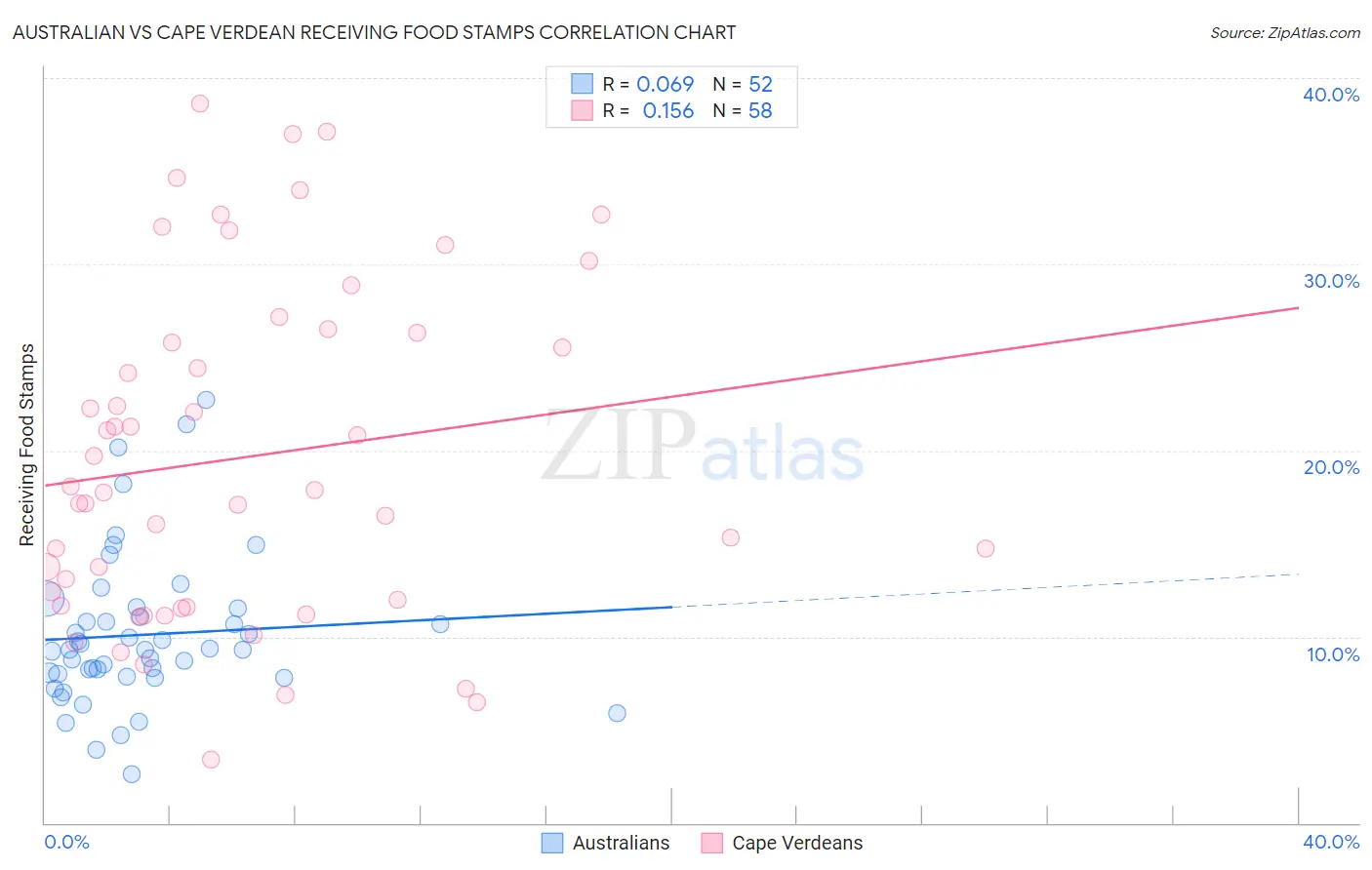Australian vs Cape Verdean Receiving Food Stamps
COMPARE
Australian
Cape Verdean
Receiving Food Stamps
Receiving Food Stamps Comparison
Australians
Cape Verdeans
9.6%
RECEIVING FOOD STAMPS
99.4/ 100
METRIC RATING
46th/ 347
METRIC RANK
21.1%
RECEIVING FOOD STAMPS
0.0/ 100
METRIC RATING
337th/ 347
METRIC RANK
Australian vs Cape Verdean Receiving Food Stamps Correlation Chart
The statistical analysis conducted on geographies consisting of 223,620,943 people shows a slight positive correlation between the proportion of Australians and percentage of population receiving government assistance and/or food stamps in the United States with a correlation coefficient (R) of 0.069 and weighted average of 9.6%. Similarly, the statistical analysis conducted on geographies consisting of 107,485,738 people shows a poor positive correlation between the proportion of Cape Verdeans and percentage of population receiving government assistance and/or food stamps in the United States with a correlation coefficient (R) of 0.156 and weighted average of 21.1%, a difference of 118.9%.

Receiving Food Stamps Correlation Summary
| Measurement | Australian | Cape Verdean |
| Minimum | 2.7% | 3.4% |
| Maximum | 22.7% | 38.6% |
| Range | 20.0% | 35.2% |
| Mean | 10.1% | 19.6% |
| Median | 9.3% | 17.8% |
| Interquartile 25% (IQ1) | 7.9% | 11.7% |
| Interquartile 75% (IQ3) | 11.3% | 26.3% |
| Interquartile Range (IQR) | 3.3% | 14.6% |
| Standard Deviation (Sample) | 4.1% | 9.0% |
| Standard Deviation (Population) | 4.0% | 9.0% |
Similar Demographics by Receiving Food Stamps
Demographics Similar to Australians by Receiving Food Stamps
In terms of receiving food stamps, the demographic groups most similar to Australians are Indian (Asian) (9.6%, a difference of 0.070%), Immigrants from Belgium (9.6%, a difference of 0.080%), Immigrants from Denmark (9.6%, a difference of 0.11%), Russian (9.6%, a difference of 0.17%), and Immigrants from Czechoslovakia (9.6%, a difference of 0.19%).
| Demographics | Rating | Rank | Receiving Food Stamps |
| Immigrants | Bolivia | 99.5 /100 | #39 | Exceptional 9.5% |
| Immigrants | Netherlands | 99.5 /100 | #40 | Exceptional 9.5% |
| Cambodians | 99.5 /100 | #41 | Exceptional 9.5% |
| Immigrants | China | 99.5 /100 | #42 | Exceptional 9.6% |
| Croatians | 99.5 /100 | #43 | Exceptional 9.6% |
| Immigrants | Denmark | 99.4 /100 | #44 | Exceptional 9.6% |
| Immigrants | Belgium | 99.4 /100 | #45 | Exceptional 9.6% |
| Australians | 99.4 /100 | #46 | Exceptional 9.6% |
| Indians (Asian) | 99.4 /100 | #47 | Exceptional 9.6% |
| Russians | 99.4 /100 | #48 | Exceptional 9.6% |
| Immigrants | Czechoslovakia | 99.4 /100 | #49 | Exceptional 9.6% |
| Lithuanians | 99.4 /100 | #50 | Exceptional 9.7% |
| Asians | 99.3 /100 | #51 | Exceptional 9.7% |
| Immigrants | South Africa | 99.3 /100 | #52 | Exceptional 9.7% |
| Tongans | 99.3 /100 | #53 | Exceptional 9.7% |
Demographics Similar to Cape Verdeans by Receiving Food Stamps
In terms of receiving food stamps, the demographic groups most similar to Cape Verdeans are Navajo (21.1%, a difference of 0.060%), Immigrants from Cuba (20.8%, a difference of 1.2%), Dominican (21.4%, a difference of 1.4%), Yakama (21.4%, a difference of 1.7%), and Tohono O'odham (21.5%, a difference of 1.9%).
| Demographics | Rating | Rank | Receiving Food Stamps |
| Pima | 0.0 /100 | #330 | Tragic 19.0% |
| Immigrants | Caribbean | 0.0 /100 | #331 | Tragic 19.6% |
| Pueblo | 0.0 /100 | #332 | Tragic 19.9% |
| Inupiat | 0.0 /100 | #333 | Tragic 20.1% |
| Yuman | 0.0 /100 | #334 | Tragic 20.2% |
| Immigrants | Cuba | 0.0 /100 | #335 | Tragic 20.8% |
| Navajo | 0.0 /100 | #336 | Tragic 21.1% |
| Cape Verdeans | 0.0 /100 | #337 | Tragic 21.1% |
| Dominicans | 0.0 /100 | #338 | Tragic 21.4% |
| Yakama | 0.0 /100 | #339 | Tragic 21.4% |
| Tohono O'odham | 0.0 /100 | #340 | Tragic 21.5% |
| Hopi | 0.0 /100 | #341 | Tragic 21.6% |
| Immigrants | Yemen | 0.0 /100 | #342 | Tragic 21.6% |
| Immigrants | Dominican Republic | 0.0 /100 | #343 | Tragic 22.1% |
| Lumbee | 0.0 /100 | #344 | Tragic 22.9% |